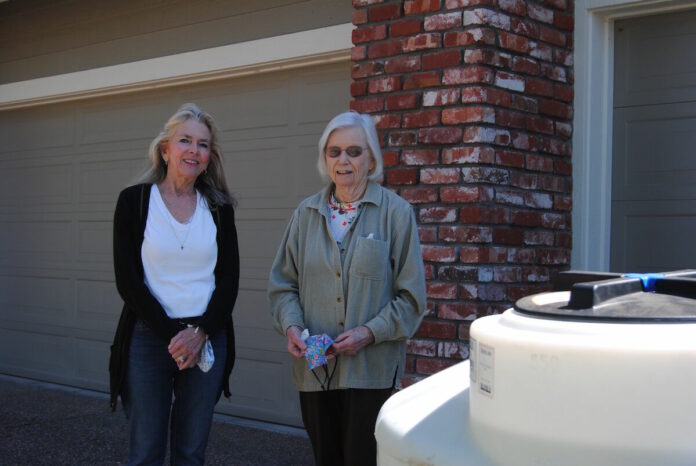It’s been a long time since rain fell and the reality of severe drought is sinking in for seniors in Healdsburg, where the city has mandated a 40% reduction of water use.
The restriction applies to residential, commercial and industrial customers, unless the city grants exemptions for those with honest intent to conserve as much as possible. Healdsburg reached Stage 3 of its emergency water conservation measures in early June and repeated violations could lead to fines of up to $1,000.
In June, the city also established its residential recycled water distribution program, delivering recycled water to homes from Healdsburg’s wastewater treatment plant at Foreman Lane. The program requires customers to get their own storage container, hoses, piping and equipment to use the water on their landscapes.
Felicia Smith, a city utility conservation analyst, said the use of recycled water can help residents comply with water limits and keep key food-producing plants, trees and shrubs alive. Further, the tanks can be linked to downspouts to catch water during the eventual rainy season as well, she said.
Getting word and resources out to get the water savings on
Anna Grant, supervisor of the Healdsburg Senior Center, said the seniors are “very concerned about making sure they are doing their part to help get everyone through this crisis.”
She continued, “You know, many of them have lived through the drought that happened in the 1970s, so this isn’t new territory for them, and they definitely want to be part of the solution, not the problem.”
She’s found that Healdsburg’s senior residents are motivated to do their part — and not just because there could be a large fine. Grant said she’s heard people talk amongst themselves about how to get a recycled water tank.
But a gallon of water is roughly eight pounds, and there are still concerns for older and more frail seniors moving buckets of water back and forth.
“That’s where really helping a neighbor can work out,” Grant said. “You know, there’s a lot of mixed ages in those river communities.”
Someone in their late fifties or early sixties can lend a hand to someone near 100 years old, “struggling with a hose.”
Grant said she’s shocked how often neighbors are willing to step up and offer their help to a community member in need, adding how meaningful it is when people keep an eye out and check in with seniors on whether they heard recent news or noticing when someone stops going out as much and seems to be declining.
Over the pandemic, Grant said the senior center got the Neighbors Network program back up and running after local activist Gail Jonas first created it years ago.
The city connects folks in need with volunteers who can assist with tasks like “minor home maintenance,” and errands, per the city’s website, or personal grocery shopping and dog-walking, Grant said.
The senior center has also had a Care Call program over the pandemic where people dial up more isolated seniors to talk and update them on everything in the newsletter, she said.
To communicate with seniors, Grant said the senior center uses Facebook, its city website and a print newsletter mailed to members’ houses and available at community centers and the senior center for non-members.
“It’s an interesting age demographic that we have right now. We have what I call the senior seniors, who might prefer one type of communication — which might not be the type of communication you think,” she said.
Seniors adapt to water conservation efforts with some accessibility challenges
Barbara Tuscany isn’t a senior, but she relates to some of the challenges accessing some of Healdsburg’s conservation efforts as a disabled woman and the daughter of seniors in town.
After observing her parents, neighbors and what she’s heard at the Healdsburg Senior Center, some of Tuscany’s main concerns are how accessible these conservations are physically and financially for those on fixed incomes.
She has a wastewater tank that allows her household to water their garden while she fills her therapy pool, since the water filter can break and the pool can “pop” if left unmaintained.
“But a lot of our seniors trying to do this, they’re fall risks. So, to try to do some of the extra activities requires an able-mobile person,” she said.
If a senior has the money to spend on a wastewater tank, they’re still dragging the hose around, Tuscany said.
Her neighbors, all seniors, didn’t realize how much physical work a wastewater tank calls for when they got them, she said, catching them out of breath and growing concerned about exertion in the sun and heart health.
“My dad was trying to do this, taking the bucket and then watering his plants, so he’s carrying a bucket around — he’s got a bad shoulder, he uses a cane and he’s almost falling a bunch of times. He’s like, ‘I’ve got to save water and I can’t water my plants anymore,’” Tuscany said. Caring for one’s yard can give older folks a sense of purpose, she added.
In addition to her concerns about physical injuries, Tuscany said further information on stretching one’s budget and water-saving measures is also on her mind. “So, it’s frustrating to hear seniors say, how do we make our budget work, how do we stretch our money more?”
Tuscany continued, “We’ve all gotten the notices from the city. It tells you what you need to do, but there’s not, like, how you actually do it. So, tips and tricks about how to save water, those things.”
In particular, she’s thinking about the homebound population that may be out of touch with this information if they aren’t connected to the city’s senior center.
Electricity use also poses an accessibility concern for the resident. “ A lot of our seniors have medical problems. They’re just not able to just turn off the air conditioner in a sense, or they use a lot of electricity because they’re on oxygen machines or they’re on medical equipment that has to be on all the time, or they’re in wheelchairs that they have to plug in all the time,” she said.
The recycled water program is working out alright for 87-year-old Mary Jeanne Lewis, with the help of her neighbor, Pamela Drexler.
“I’m grateful to have it and I’m very grateful that Pam went to the trouble of explaining it and getting me organized to be able to use it,” Lewis said.
The city delivers the allotted 500 gallons to a huge tank in front of her house each week, half used by weekly gardeners and the rest by Lewis directly. It’s not the same as rain, but the trees are a must, she said.
Described by Grant as the image of resiliency for seniors saving water, Lewis said, “I’ve lived a long time and many places, I guess.”
Though her family mostly lives in Alaska, she said she didn’t even have to ask for help with the conservation effort because people volunteered.
Her family visited her in Healdsburg and helped order the tank and pump online. “Well, in this period of time, you need to know your way around the iPhone and ordering things online, and I don’t feel too comfortable with it, so if I can get somebody else to do it, that’s what I do,” Lewis said.
She added, “If I had to do it, I’d have to do it,” a phrase she invoked a few times during her interview. Thankfully, Lewis noted, she could rely on her neighbor if she could use some assistance.
Drexler had her hired handyman put the equipment together in Lewis’ front yard. “We made sure she contacted the city to be arranged to be getting the water,” Drexler said, having aided her next door neighbor in securing a tank also.
Regarding mobility and safety, Lewis said, “I wouldn’t attempt to use buckets of water because of my age. If I slipped and fell, then broken bones, you know.” Instead, she sometimes fills a water can for the planter box.
Otherwise, Lewis said she personally finds it easy as one elderly person to stay within her water allowance, no longer letting the water run. Lewis lived in Alaska during the 1970s drought in California, one of the driest periods in state history, but Drexler said she remembered it from when she was in college.
“It didn’t seem this devastating, I don’t know why. But we weren’t having the same fire issues and stuff. I think that complicates it, thinking that everything goes dry and then there’s these horrific fires,” she said.
Growing up, Drexler said water had often been treated as a given in California, so the current drought emergency has made her household much more aware of their water use.
“You could take a shower for as long as you want, you know, you didn’t have to think about how many loads of laundry you did every day, so it’s really creating a lot of mindfulness about your water consumption,” she said.
Drexler also uses a water monitor so she can track her household’s usage more closely. “It’s a big shift from what you’re just used to,” she said of Healdsburg’s mandated 40% water reduction.
“We’re overall experiencing it together and trying to find solutions, but I think this is kind of a stop-gap measure. According to what some people say, it’s going to be many years of drought. That’s why I’m thinking about desalination,” Lewis said.
Over recent years of disaster, Lewis said, “A lot of it, you just do it naturally. You have to figure out how to solve issues and how to manage things when they come along. I don’t think anything we were prepared for, so it’s just coming up with solutions.”
Healdsburg utility conservation analyst breaks down some rules and tools
Smith said the city approached the drought using a multifaceted strategy to reach as many people as they could, including publishing information in print, using an electronic city newsletter, Facebook and putting information in the senior center’s monthly newsletter.
She offered several key understandings of how residents can best get with the program and increase their water saving.
Residents can still hose and hand-water some key plants with their drinkable, potable water so long as residents stay within their 74-gallon water allowance, Smith said.
Smith said she should work to improve her collaboration with community services and age-friendly programs to let people know they can use the hose if they can stay within their daily budget. “That can be a much easier solution than trying to get a recycled water tank, set up the pump, etc.”
As for $1,000 fines, Smith said the city hasn’t issued any for conservation infractions so far. Most of the enforcement addresses prohibited irrigation, with a public works staffer doing rounds in the early morning and community reports that someone’s sprinklers are on, she said.
A letter or sometimes a phone call from Smith warning residents to comply comes before any fines are issued, she said, “and it seems to resolve itself.” The conservation analyst said it’s pretty easy to comply with the 74 gallons a day per person restriction when irrigation is off.
Healdsburg’s water budget came forward when Healdsburg’s rights were being curtailed. Smith said the city asks that people with medical needs that call for additional water, like doing more laundry or flushing more often contact the city to get that noted in their account.
That way, the city can assess high water users and find there’s more to it, “be it there’s seven people in the house or there’ a medical reason for additional water use.'”
Further, the city continues to offer the Healdsburg CARE program, providing discounted monthly water, sewer, stormwater and electric charges for eligible low-income customers who submit an application.
Smith said Healdsburg actually expanded the income eligibility to allow more people to receive the 25% electric utility discount, though other regulations prevented the city from accomplishing the same for the 15% water discount.
The CARE program also offers a 20% discount off sewer and stormwater charges, per the program information updated May 12, 2020.
Smith said the city provides resources for residents who need extra help, like a technical expert who can answer questions about what tank to get and how to use it. He does assessments and assists with trickier projects or issues at the resident’s house. Further, Healdsburg employs an assistant in the summer who helps install flume devices at people’s houses, Smith said.
To seek this assistance, Smith recommended people reach out to the city at co**********@**************ca.us. However, the analyst said there are also many people in the community that likely want to step up and help out other residents.
“I feel like the Healdsburg community, particularly the residential community, has really banded together to ensure that we meet our water reduction goals and I would encourage folks to lean on that network and ask for help,” she said. “It’s just a matter of asking.”









